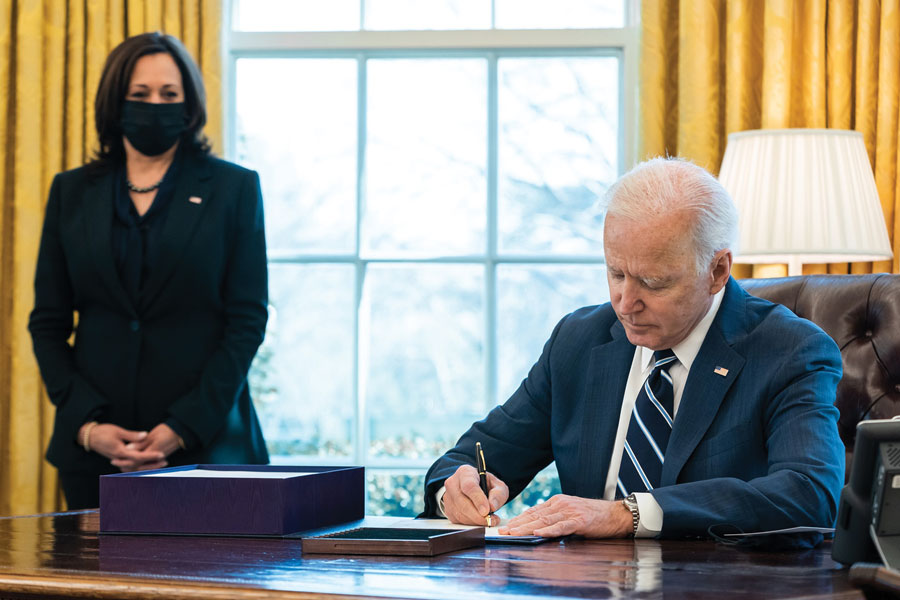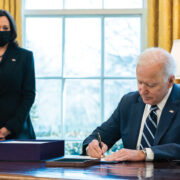
All American adults to be eligible for vaccines by May 1
Hours after President Joe Biden signed his massive $1.9 trillion coronavirus relief bill on Thursday, March 11, he delivered his first primetime address unpacking the toll of the COVID-19 pandemic and declared what he called a “war footing” approach to beating the virus.
Nearly one year ago, the pandemic forced countries all over the world to a standstill, but the effect the pandemic had on the United States was particularly striking. Confusion and poor decision-making on all levels of government and bureaucracy led to millions losing their lives and even more suffering an enormous economic loss.
“While it was different for everyone, we all lost something — a collective suffering, a collective sacrifice, a year filled with the loss of life and the loss of living for all of us,” the president said from the White House in his address to the American people.
“The only way to get our lives back, to get our economy back on track, is to beat the virus,” Biden continued. “That’s why I’m using every power I have as president of the United States to put us on a war footing to get the job done.”
Biden’s massive $1.9 trillion relief package — which was approved by Congress this week — seeks to expedite vaccine distribution, provide millions of taxpayers with a $1,400 stimulus check and increase funding and support for schools and colleges to safely reopen.
In his Thursday night address, Biden said that the U.S. will “have enough vaccine supply for all adults in America by the end of May.”
He also announced that he is directing all states, tribes and territories “to make all adults, people 18 and over, eligible to be vaccinated no later than May 1.”
“And let me be clear,” he explained. “That doesn’t mean everyone’s going to have that shot immediately, but it means you’ll be able to get in line beginning May 1. Every adult will be eligible to get their shot. And to do this, we’re going to go from a million shots a day that I promised in December before I was sworn in, to maintaining, beating our current pace of 2 million shots a day, outpacing the rest of the world.”
Biden added that his administration is working with state and city leaders “in red and blue states” to establish “600 federally supported vaccination centers” that can administer hundreds of thousands of doses per day.
Among the measures of the bill — dubbed the American Rescue Plan — includes the much anticipated $1,400 stimulus checks and an extension of federal unemployment benefits ($300 a week).
The $1,400 checks, which were promoted as an add-on to the $600 stimulus checks approved by the federal government in late 2020, are expected to be distributed to an estimated 17 million Americans by the Internal Revenue Service (IRS) later this month.
The American Rescue Plan also seeks to expand pandemic-related benefits, including a per-child cash payment of at least $3,000 for one year and an expansion of health care subsidies from the Affordable Care Act for two years.
The unemployment benefits would be extended through Sept. 6. Regarding the $1,400 stimulus checks, couples who file jointly would receive double that and an additional $1,400 for each dependent.
The stimulus checks apply to individuals earning up to $75,000 a year and married couples whose combined income does not exceed $150,000 a year.
However, the check’s amount would decrease for those who make more than these benchmarks with a strict cut-off at $80,000 for individuals and $160,000 for married couples.
Most Americans will receive the full amount from the IRS; according to the U.S. Census Bureau, the median household income in the country was $68,703 in 2019.
The bill also allocates $130 billion in federal aid to K-12 schools, specifically to reduce class sizes and adjust classrooms to comply with social distancing and personal protective equipment guidelines.
The bill also creates a new $25 billion aid program to businesses hurt by the pandemic, granting up to $10 million per company with a limit of $5 million per brick-and-mortar location.






